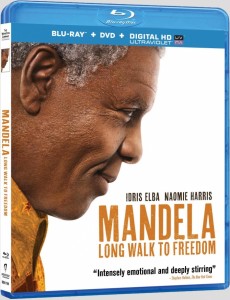 Mandela: Long Walk to Freedom strives to be the definitive biography of the great Nelson Mandela’s life. With two strong leads in Idris Elba as Mandela and Naomie Harris as his wife, Winnie, plus Mandela’s own autobiography as its source material, Mandela has the makings of a compelling and important film.
Mandela: Long Walk to Freedom strives to be the definitive biography of the great Nelson Mandela’s life. With two strong leads in Idris Elba as Mandela and Naomie Harris as his wife, Winnie, plus Mandela’s own autobiography as its source material, Mandela has the makings of a compelling and important film.
The story begins in a colorful and imaginative sequence showing Mandela as a teen (presumably in the 1930s), painted and naked amongst his clansmen in a South African village. As they go through a ritual, the adult Mandela reflects in voice over about those simple times and the nickname he was given by his father: ”troublemaker.” The film then jumps to 1942, when Mandela (portrayed with strength from this point forward by Elba) is an established and successful lawyer, practicing law in Johannesburg, South Africa. Working within a political system that has racism written into its constitution, Mandela manages to work within the political system and around it whenever he can.
Screenwriter William Nicholson (Gladiator) and director Justin Chadwick (The Other Boleyn Girl) do not shy away from Mandela’s shortcomings in his early professional days. He’s a womanizer, materialistic and full of pride. When approached by members of the African National Congress (ANC) to join their group in opposition to the South African government, Mandela has no interest. It’s not until a friend is arrested and murdered in jail by brutal police officers that he can no longer stand on the sidelines.
From there, the film picks up the pace and begins to show how Mandela the lawyer gradually became Mandela the leader. Once again, the filmmakers take a ”warts and all” approach to this Mandela’s life story. They don’t gloss over the fact that Mandela was unfaithful to his first wife, Evelyn (Terry Pheto), and that he spent more time as an activist than as a father to their two sons.
After Evelyn leaves Mandela, he soon thereafter meets Winnie. They fall in love, marry and become inseparable. Together they fight the cause of the ANC. It doesn’t take long before Mandela’s radical opposition to the South African government begins to involve bombs and guns. He becomes a fugitive. While in hiding, the police intimidate Winnie, interrogating her and ransacking her home. Mandela proves to be a film just as much about Winnie’s torment as it is about the great man’s life.
Up until this point, Mandela does its best to include as much information as possible about Mandela’s life. Unfortunately, in doing so, it slips into the trappings of a standard bio-pic. There are montages that are meant to tie together key moments from Mandela’s life, and the script becomes very episodic. If not for the searing performances by Elba and Harris, Mandela could have veered into bad TV movie territory.
When Mandela is apprehended and sentenced to life in prison, the movie takes on a new tone, and it finally has the chance to become the transformative story it wants to be. However, those same issues that plague the early portions of the film pop up again. Instead of actually seeing Mandela’s spiritual change in prison, we only learn about it after Elba has been buried under makeup effects and he tells the audience that he has changed. However, Winnie’s story does provide us with the information to understand how she became an angry revolutionary full of hatred for her oppressors. We see Winnie abused in prison and left in solitary confinement for months.
After the film reaches the two-hour mark, and Mandela is released and has negotiated changes in South Africa, the film begins to drag. His release from prison could have been a solid end to the movie. But the filmmakers chose to carry on, in order to show the first South African election to count black votes. In doing this, they also had to show how Nelson and Winnie’s marriage collapsed under the weight of his 27 years in prison and the way their political viewpoints had grown apart. By doing this, Mandela makes Winnie’s character appear cold and unloving.
Obviously the complexities of the Mandela’s marriage and the years apart made it difficult for these two human beings to stay together. However, after two hours of building up Mandela’s character and telling us of how great he is, Winnie’s actions seem hurtful.
Mandela really should have focused on one portion of the man’s life, either his early days in the RNC up to his trial, or his days in prison and what he had to go through to remain strong during those long 27 years. By cramming the movie with so much information, the film doesn’t do Mandela or his remarkable story justice. Conveniently, it ends just at the right spot where you could then rent Clint Eastwood’s sleepy Invictus, starring Morgan Freeman as Mandela. Someday I’m sure a film following Mandela’s days in college and his first years as a lawyer will get made. Actually, that would make a pretty good movie. Just like Abraham Lincoln, Nelson Mandela is one historical figure whose life story could justify multiple motion pictures. Let’s hope that the next time around the filmmakers don’t try for definitive, and just try for good storytelling.





Comments